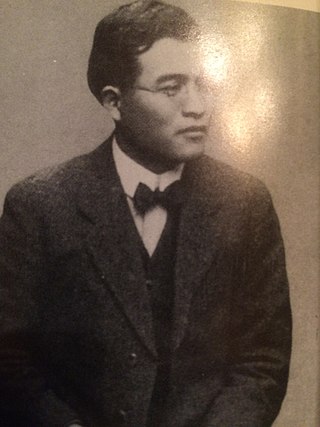Chikashi Koizumi
From Wikipedia, the free encyclopedia
Chikashi Koizumi (古泉 千樫 Koizumi Chikashi; 1886–1927) was a Japanese tanka poet. After initially working as a primary school teacher in his native Chiba Prefecture, he moved to Tokyo and became a full-time poet. He published in several prestigious poetry magazines, even helping to found both Araragi and Nikkō, before setting up his own poetic society, the Aogaki-kai, and taking on disciples. He died before the society's organ could see print.

Biography
Chikashi Koizumi was born on 26 September 1886.[1] He was born in Yoshio Village, Awa District (modern-day Kamogawa City), Chiba Prefecture.[2]
His real name was Ikutarō Koizumi (古泉 幾太郎 Koizumi Ikutarō),[3] and he also used the pseudonyms Kosai (沽哉), Suinansō-shunin (椎南荘主人) and Minooka-rōjin (蓑岡老人).[2]
He graduated the Chiba Prefecture Teachers' Training Centre (千葉県教員講習所 Chiba-ken Kyōin Kōshū-sho),[2] and for a time worked as a primary school teacher,[3] before resigning in 1908[2] and moving to Tokyo.[3]
He died on 11 August 1927.[1]
Writings
Koizumi published many of his early tanka poems in the Tokyo daily newspaper Yorozu Chōhō.[2] When he was 17 he published a poem in Kokoro no Hana,[2] and then in the tanka journal Ashibi (馬酔木).[2]
He was a disciple of Itō Sachio.[2] After moving to Tokyo in 1908, he helped found the important poetry magazine Araragi.[2] He had a close working relationship with the poet Saitō Mokichi.[2] In 1913 he co-authored Bareisho no Hana (馬鈴薯の花) with Kenkichi Nakamura.[2]
In 1924, he joined Yūgure Maeda, Hakushū Kitahara, Toshiharu Kinoshita, Zenmaro Toki and others in forming a group to publish a new literary magazine, Nikkō, which was to be purely devoted to Modernism.[4] The following year, he published a personal anthology, Kawa no Hotori (川のほとり).[2] Other collections of his poetry include Okujō no Tsuchi (屋上の土), Seigyū-shū (青牛集), and Teibon Koizumi Chikashi Zenkashū (定本古泉千樫全歌集).[2]
In 1926 he founded the Aogaki-kai (青垣会) and took on students,[2] but before their poetry journal Aogaki could enter publication Koizumi himself died.[2]
References
Works cited
Wikiwand - on
Seamless Wikipedia browsing. On steroids.
